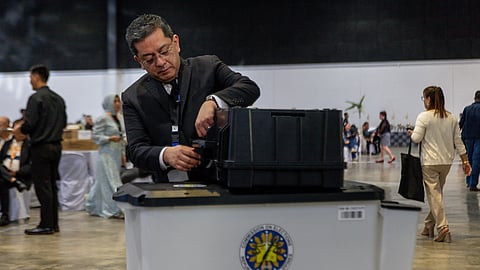
- NEWS
- the EDIT
- COMMENTARY
- BUSINESS
- LIFE
- SHOW
- ACTION
- GLOBAL GOALS
- SNAPS
- DYARYO TIRADA
- MORE

The Commission on Elections (Comelec) prefers an automated Barangay and Sangguniang Kabataan Elections (BSKE) rescheduled for 2 November next year, but it will require P27 billion in needed funds, its chair said Monday.
The amount is P15.2 billion higher than the proposed budget allotted for the Comelec under the 2026 National Expenditure Program approved by the Department of Budget and Management.
Poll body chair George Garcia told the House committee on appropriations that they originally proposed P19 billion for the BSKE, but it was slashed by P8 billion by the DBM, leaving the Comelec with P11.8 billion.
The amount is significantly lower than the needed P27 billion for an automated BSKE, which Garcia claimed could expedite the vote counting in just one hour, if not 30 minutes.
“You know, it’s better when it’s automated. Comelec had been pushing for an automated election. We know that in 2023, we ran a pilot test in […] Quezon City and Dasmarinas, Cavite, and just within one hour, we already knew the winning chairman. Actually, it only took 30 minutes,” Garcia told lawmakers during the budget briefing.
In an interview in May, following the midterm polls, Garcia emphasized the need to ditch the manual vote counting and shift to automated BSKE, claiming that fast-tracking the poll process will mitigate the occurrence of election-related violence, such as among others, killings and ballot snatching.
The BSKE was supposed to be held on 1 December of this year, but President Marcos Jr. signed Republic Act 12232 on 13 August, effectively moving the elections to 2 November 2026.
The law also extended the term of office of barangay and SK officials from three to four years, with the former being able to run for up to three consecutive terms or 12 years. SK officials, however, could only serve for a single term.
Garcia told lawmakers that even with P11.8 billion, Comelec will still face a budget deficit of P6 billion to P9 billion for the BSKE next year, asserting that the increase in the number of newly registered voters requires an additional number of precincts, teachers, and electoral board members.
The P9 billion in additional funds will be utilized for P2,000 per teacher’s honoraria and extra support staff. Without the honoraria, Comelec still requires P6 billion in extra budget to cover other election paraphernalia such as official ballots.
Newly registered voters for the BSKE are projected to hit up to 4 million by July next year, with the 2.8 million already recorded from 1 to 10 August.
This will entail an additional 400 to 600 precincts with at least three teachers, extra ballot boxes, all of which are not covered by the P11.8 billion budget allocated for Comelec for 2026, Garcia averred.
The reduction in the funding also cut Comelec’s budget for deployment, training, and, more importantly, the voter education campaign, which was initially allotted P145 million under the Comelec’s proposal.
FPJ Panday Bayanihan Rep. Brian Poe lamented it as “unacceptable,” asserting that needed electoral reforms will fail to materialize without the supporting funding for the voters education campaign.
